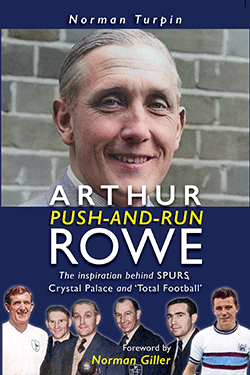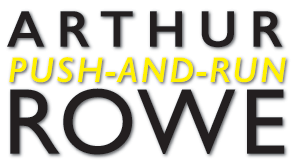
HARDCOVER - 420 pages
Over 100 images
PUBLISHED: AUGUST 2023
|
Special offer
from the publishers |
THE INSPIRATION BEHIND SPURS,
CRYSTAL PALACE AND 'TOTAL FOOTBALLby Norman Turpin - Foreword by Norman Giller
Arthur Rowe was a post-war football visionary in an era when the English game was wedded to outdated tactics and thinking. After taking over at Second Division Spurs he won promotion as champions and then the League title in successive seasons, a feat never repeated since. Yet it wasn’t so much the trophies that marked Rowe’s reign as much as Tottenham’s football. His ‘team of no stars’ played the ball first time along the floor and moved as one unit forward and back - a tactic that pre-dated Total Football by two decades and tiki-taka by half a century.
A softly spoken lad who supported Spurs as a boy, Arthur had enjoyed an all-too brief career as a thinking man’s centre-half, captaining his club to promotion before earning a solitary England cap where his cerebral qualities were frowned upon. A knee injury shortened his career but on the eve of the second war the FA asked him to visit Hungary to coach their coaches.
Impressed by the skill of his hosts he urged the Hungarians to accept some of the rougher elements of British play while he spread his theory of the game which would later be named ‘push and run’ but in Arthur’s words was ‘doing the obvious, mate’, namely passing short to feet rather than aiming hopeful punts downfield for forwards to chase. After the war he was appointed Chelmsford City boss where he won the league at the first attempt and within 5 years he was winning back-to-back league titles with his boyhood club playing revolutionary football.
Yet while Spurs' football seemed to be from the jet age, the style of football in the rest of the country seemed to be wedded to an era of candlelight and the horse and cart. During the thirties and forties English football had contented itself with bruising international victories over Continental opposition but the visit of Hungary in 1953, whose manager, Gusztáv Sebes, Rowe had coached before the war, exploded the myth of English football primacy as the Magnificent Magyars won 6-3 at Wembley and 7-1 in Budapest a year later. During the period of navel-gazing that followed many critics pointed out that the solution to their problems lay right under their noses at White Hart Lane in the shape of Arthur Rowe and ‘push and run’.
Sadly the enthusiasm for Rowe’s stellar soccer wasn’t shared by either the FA or the directorate at Tottenham and he was given little to spend on an ageing squad. The carping got the better of him and Arthur reluctantly stepped down in 1955 however he had laid the blueprint for future success which would arrive with Bill Nicholson’s Double team and Spurs stellar team of the sixties. Arthur went on to take the reins at Fourth Division Crystal Palace in 1960 and predicted they’d be in the top flight by the end of the decade. Playing the same push and run style as Spurs, Palace won the Fourth Division that season and, although Arthur stepped down in 1965, they fulfilled his promise by reaching the First Division in 1969.
In semi-retirement Arthur was as a well-regarded youth scout for a variety of London clubs during an era when his football philosophy was being spread overseas while English football conformed to yet another orthodoxy, ironically the 4-4-2 favoured by his old left-back at Spurs, Sir Alf Ramsey. It would take another three decades and the arrival of overseas coaches before the English game would finally move on from direct football.
As Norman Turpin’s extensive illustrated biography makes clear, the tactics of Gusztáv Sebes, Rinus Michels, Johann Cruyff, Pep Guardiola and Jurgen Klopp can all be traced back to Arthur Rowe - a forgotten English visionary whose ideas were taken up enthusiastically by European coaches yet continually overlooked by his countrymen to the detriment of the national game.
Empire Publications, 1 Newton Street,
Manchester M1 1HW Tel: 0161 872 3319 Fax: 0161 872
4721


